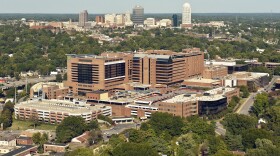Researchers at Wake Forest Baptist Medical Center in Winston-Salem have made progress in their efforts to replicate human kidneys.
Regenerative medicine can sometimes sound futuristic, but doctors at Wake Forest are actually using kidneys from deceased pigs with the hope they could one day be transplanted into human patients. The concept is to let the original cells die off, then take human tissue to re-grow the organ in a lab.
Recently, doctors have developed a method to keep blood vessels open and allow blood to flow through these new regenerated organs.
"Now, we want to make sure that the whole three dimensional structure remains viable, that blood will flow through it and that it can remain viable long-term," said Dr. Anthony Atala, director of the Wake Forest Institute for Regenerative Medicine.
"This complex blood vessel structure is necessary because that's what feeds the organ and keeps cells alive. And therefore one of the main challenges as we're trying to create cells or organs is how to we make sure we reproduce that three-dimensional blood vessel structure within the organ."
With this method for blood flow, the regenerated kidneys can function for several hours, on their own.
One long-term goal is to construct a kidney that would function for years and could be transplanted into humans. Atala says there is precedent to using parts from pigs.
For more than thirty years, heart valves have been used in human patients following the same practice of letting the original cells die off.





